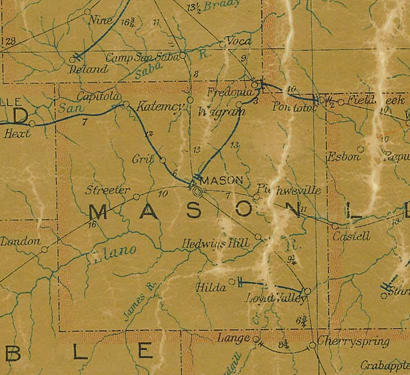|
Early-day
Texans and Comanches were not always trying to kill each other, it
just seemed like it.
The Republic
of Texas, and later the U.S. government, did execute a few peace
treaties with the Indians, but the problem was more complicated than
something a mere signature could fix. A well-meaning chief might agree
to lasting peace, but in a culture built largely on raiding, bravery
in battle and the number of horses a man owned, not every ambitious
young man in his tribe was likely to go along with a written agreement
of non-hostility. And not every Comanche headman, either.
One Comanche who did put his sign on a piece of paper and lived up
to it was a Penateka chief named Katemoczy, who often
camped along the San Saba River in the northwest corner of what would
become Mason County.
German immigrant John Meusebach worked out that treaty with the Comanches
in 1846 and it held. Because of that document, German settlers in
the Hill Country,
while not immune from Indian depredations, fared better than many
other frontier Texans.
As Mason County began
to settle up, some held the chief in high-enough esteem to name one
of their towns in his honor, though it was an afterthought. When settler
Andrew Jackson Coots built a cabin in the area in the latter 1870s,
people started calling the community that developed around Cootsville.
Dr. William F. Cowan and his wife moved to the area in 1879. Whether
it was the doctor’s idea or one of his two sons, the place came to
be called Katemcy
in misspelled honor of Chief Katemoczy. One of the doctor’s sons,
Alfred R. Cowan, donated land for the Katemcy
town site around 1880. Four years later, he became Katemcy’s
first post master. |
 |
Mason
County Texas 1907 Postal map showing Katemcy
(Above "S" in "MASON")
Courtesy Texas General Land Office |
|
One
of seventeen post office towns in Mason
County, Katemcy
flourished until the mid-1920s. In its peak years, it had two drug
stores, two general stores, two blacksmith shops, a barber shop,
a business described as a “chili shack,” three churches and a school
with three teachers.
“We have two churches, and preaching every Sunday,” someone from
Katemcy
wrote for the Mason County News in January 1887, “but we
are liable to accidents here as elsewhere and want some good doctor
[Dr. Cowan was getting up in years and no longer practicing medicine]
who will not charge unreasonable for his services to come and make
his home among us.” In addition to a doctor, the town needed a “general
merchandise business” that would “sell goods at a living price and
buy our corn, cotton and coon skins.”
Half of the letter was taken up with a plea for improved transportation.
“We want,” the writer continued, “and will have a public road to
Mason
or move our trade to Brady
or Brownwood.”
In fact, on the day this correspondent put words to paper, January
14, the able bodied men of the community had worked on the road
from Katemcy
to Mason,
a distance of twelve miles. Still, more improvements were needed.
(This was long before pavement, of course.) The letter writer said
a petition would be presented to the county commissioner’s court
“for a public road of the third class and we want to see Mason co-operate
with us.”
Indeed, the writer continued, Mason
needed a good road as badly as Katemcy.
Then the writer made his most prescient point of all: “If we do
not get the roads now while the country is new, it will cost money
to get them later....”
For a time, the forerunner of Highway 87 from San
Antonio to San
Angelo passed through Katemcy,
bringing with it just enough out-of-town business to keep the economy
alive. But when state engineers relocated the highway about a mile
to the west, the impact on Katemcy
proved severe and the town began a slow decline to just shy of ghost-town
status.
One thing that has lasted, however, is a historical marker put up
in 1967 at the site of what for years had been the smallest piece
of state-owned land in Texas. Intended
for use as a mini-state park, the tract eventually went back to
private ownership. Katemcy,
meanwhile, has been virtually forgotten along with an Indian chief
who preferred peace to war.
© Mike Cox
"Texas Tales" -
February 20, 2013 column
Related Topics:
Texas Towns
Texas Ghost Towns
|
| Books
by Mike Cox - Order Here |
|
|
